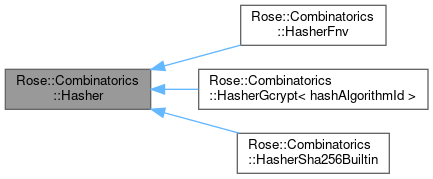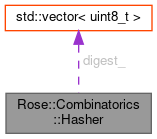Description
Hash interface.
This class defines the API for hash functions. A hash function takes an arbitrary size message as input and returns a fixed size digest. The subclasses implement specific hash functions, the digests of which are different sizes. For instance, a SHA1 digest is always 20 bytes, and a SHA512 digest is always 64 bytes.
The digest can be computed incrementally by inserting the message in parts using various insert functions. Once the message has been fully inserted, the digest can be obtained with the digest function. The digest can be retrieved repeatedly, but no additional message parts can be added once a digest is retrieved (doing so will result in an Exception being thrown). However, the hasher can be reset to an initial state by calling clear, after which a new message can be inserted. Subclasses that return hashes that are 8 bytes or narrower sometimes have an additional method that returns the digest as an unsigned integer (but the digest method must always be present).
Hasher objects are copyable. The new hasher starts out in the same state as the original hasher, but then they can diverge from one another. For instance, if you have a multi-part message and want an intermediate hash, the easiest way to do that is to insert some message parts into a hasher, then make a copy to obtain its digest, then continue inserting message parts into the original hasher (the copy cannot accept more parts since we called its digest method). Obtaining intermediate hashes this way is usually faster than re-hashing.
The API contains a few functions for printing hashes. There's a toString function that can return the digest as a hexadecimal string and a static version that that converts a given digest to a string. Also, using a hasher in an std::ostream output operator is the same as obtaining the hasher's digest, formatting it, and sending the string to the stream. All these functions (except the static toString) call digest under the covers, thus finalizing the hasher.
New hash functions can be created very easily by subclassing Hasher and defining an append method. Often, this is all that's necessary. Other commonly overridden functions are the constructor, clear, and digest. The subclasses generally have names beginning with the string "Hasher" so they can be found easily in alphabetical class listings. For instance, see the classes and typedefs in the Rose::Combinatorics namespace.
If a hasher uses an external library (like libgcrypt) then it should be designed in such a way that the code that uses the hash compiles, but throws an exception. The Exception class is intended for this purpose, as well as all other situations where hashing fails.
Definition at line 181 of file Combinatorics.h.
#include <roseSupport/Combinatorics.h>


Classes | |
| class | Exception |
| Exceptions for hashing. More... | |
| class | HasherFactory |
| A singleton that creates and returns Hashers by name. More... | |
| class | HasherMaker |
| Templated to create any Hasher and register it with HasherFactory. More... | |
| class | IHasherMaker |
| Common subclass all the classes that construct Hashers. More... | |
Public Types | |
| typedef std::vector< uint8_t > | Digest |
| The digest of the input message. | |
Public Member Functions | |
| virtual void | clear () |
| Reset the hasher to its initial state. | |
| virtual const Digest & | digest () |
| Return the digest. | |
| virtual void | append (const uint8_t *message, size_t messageSize)=0 |
| Insert data into the digest. | |
| std::string | toString () |
| String representation of the digest. | |
| uint64_t | make64Bits () |
| uint64_t | make64Bits (const Digest &) |
| void | print (std::ostream &) |
| Print a hash to a stream. | |
| void | insert (const std::string &) |
| Insert data into the digest. | |
| void | insert (uint64_t) |
| Insert data into the digest. | |
| void | insert (const uint8_t *bytes, size_t nBytes) |
| Insert data into the digest. | |
| void | insert (const std::vector< uint8_t > &) |
| Insert data into the digest. | |
| void | insert (std::istream &) |
| Insert data into the digest. | |
| uint64_t | toU64 () |
| Returns the hash as a 64 bit int. | |
| uint64_t | toU64 (const Digest &) |
| Returns the hash as a 64 bit int. | |
Static Public Member Functions | |
| static std::string | toString (const Digest &) |
| Convert a digest to a hexadecimal string. | |
Protected Attributes | |
| Digest | digest_ |
Member Typedef Documentation
◆ Digest
| typedef std::vector<uint8_t> Rose::Combinatorics::Hasher::Digest |
The digest of the input message.
Since different hash functions have different sized digests, the digest is represented most generically as a vector of bytes.
Definition at line 187 of file Combinatorics.h.
Constructor & Destructor Documentation
◆ ~Hasher()
|
inlinevirtual |
Definition at line 201 of file Combinatorics.h.
Member Function Documentation
◆ clear()
|
virtual |
Reset the hasher to its initial state.
Reimplemented in Rose::Combinatorics::HasherGcrypt< hashAlgorithmId >, and Rose::Combinatorics::HasherSha256Builtin.
Referenced by Rose::Combinatorics::HasherGcrypt< hashAlgorithmId >::clear().
◆ digest()
|
virtual |
Return the digest.
Finalizes the hash function and returns the digest for all the input. Additional input should not be inserted after this function is called since some hash functions don't support this.
Reimplemented in Rose::Combinatorics::HasherGcrypt< hashAlgorithmId >, Rose::Combinatorics::HasherFnv, and Rose::Combinatorics::HasherSha256Builtin.
Referenced by Rose::Combinatorics::HasherGcrypt< hashAlgorithmId >::digest().
◆ insert() [1/5]
| void Rose::Combinatorics::Hasher::insert | ( | const std::string & | ) |
Insert data into the digest.
This method inserts data into a digest. Data can only be inserted if the user has not called digest yet.
Referenced by SageInterface::addMangledNameToCache().
◆ insert() [2/5]
| void Rose::Combinatorics::Hasher::insert | ( | uint64_t | ) |
Insert data into the digest.
This method inserts data into a digest. Data can only be inserted if the user has not called digest yet.
◆ insert() [3/5]
| void Rose::Combinatorics::Hasher::insert | ( | const uint8_t * | bytes, |
| size_t | nBytes | ||
| ) |
Insert data into the digest.
This method inserts data into a digest. Data can only be inserted if the user has not called digest yet.
◆ insert() [4/5]
| void Rose::Combinatorics::Hasher::insert | ( | const std::vector< uint8_t > & | ) |
Insert data into the digest.
This method inserts data into a digest. Data can only be inserted if the user has not called digest yet.
◆ insert() [5/5]
| void Rose::Combinatorics::Hasher::insert | ( | std::istream & | ) |
Insert data into the digest.
This method inserts data into a digest. Data can only be inserted if the user has not called digest yet.
◆ append()
|
pure virtual |
Insert data into the digest.
This is the lowest level method of inserting new message content into the digest. This can be called as often as desired, building a digest incrementally.
Implemented in Rose::Combinatorics::HasherGcrypt< hashAlgorithmId >, Rose::Combinatorics::HasherFnv, and Rose::Combinatorics::HasherSha256Builtin.
◆ toString()
| std::string Rose::Combinatorics::Hasher::toString | ( | ) |
◆ toU64() [1/2]
| uint64_t Rose::Combinatorics::Hasher::toU64 | ( | ) |
Returns the hash as a 64 bit int.
The return value is computed by a sequence of shift and xor operations across all bytes of the digest. If the digest is eight or fewer bytes, then this degenerates to the uint64_t interpretation of the big-endian digest.
Referenced by SageInterface::addMangledNameToCache().
◆ toU64() [2/2]
| uint64_t Rose::Combinatorics::Hasher::toU64 | ( | const Digest & | ) |
Returns the hash as a 64 bit int.
The return value is computed by a sequence of shift and xor operations across all bytes of the digest. If the digest is eight or fewer bytes, then this degenerates to the uint64_t interpretation of the big-endian digest.
◆ print()
| void Rose::Combinatorics::Hasher::print | ( | std::ostream & | ) |
Print a hash to a stream.
This is a wrapper that calls the digest function to finalize the hash, converts the digest to a hexadecimal string, and sends it to the stream.
Member Data Documentation
◆ digest_
|
protected |
Definition at line 198 of file Combinatorics.h.
The documentation for this class was generated from the following file: